Potential Careers
- Middle or high school teacher
- Biology, Chemistry, Earth and Space Science, English Language Arts, Math, Physics, Social Studies/History, Spanish
- Teacher leader
Prepare for a fulfilling teaching career through Widener’s undergraduate secondary education (grades 7-12) certification program, where you’ll learn how to teach adolescents while gaining mastery in your chosen subject area.
The secondary education bachelor's program is not currently accepting applications. Check out the other programs offered by Widener's College of Arts & Sciences.
Major
On Campus
Teachers have the unique opportunity to directly influence a student's life. By sharing knowledge and experiences with today's students you are playing a big role in fostering the possibility of a better future. As a secondary education teacher, you will not only help them grow their knowledge base but help empower them to tackle challenges with confidence.
At Widener, you’ll learn the ins and outs of being a teacher through the College of Health and Human Services' Center for Education while majoring in your chosen content area in the College of Arts and Sciences. Students have the option to pursue grade 7-12 Pennsylvania teaching certification in biology, chemistry, earth and space science, english, mathematics, physics, and social studies (history), as well as pre-kindergarten to grade 12 certification in Spanish.
Students interested in obtaining Pennsylvania secondary education certification requirements would also pursue one of the following majors while completing their education course requirements:
*Students interested in pursuing a bachelor's degree in biology, chemistry, or physics also have the option to complete the education coursework required to complete certification and should consult with their advisor to develop a plan.
**Spanish teaching certification qualifies students to teach pre-kindergarten through grade 12.
View the Loading... for general curriculum and coursework requirements for the Pennsylvania Instructional I Teaching Certification.
View curriculum requirements for your chosen teacher certification subject area(s):
College is about exploration. At Widener, you'll complete a general education curriculum that supports just that. You'll have the flexibility and freedom to dive deep into the topics that spark curiosity, challenge your mind, and power your personal and academic growth.
Along the way, you'll cultivate critical, meaningful skills employers seek, including:
It all starts with ASC 101: Thinking Through — a selection of around 40 course topics that will encourage you to go deeper and examine complex issues that shape our world and our ways of relating to one another. When you dive into the possibilities, you're sure to find multiple courses that inspire and intrigue you, regardless of whether they align with your major! Think of it as an opportunity to step outside of your comfort zone and truly learn something new. Then, in your senior year, you'll come full circle with a capstone course that takes your Thinking Through topic to new heights strengthened by everything you've cultivated along your college journey.
Eight education courses are required for secondary certification, including appropriate courses in teaching methods for the selected certification area.
In addition, students must adjust his or her subject-matter academic work to meet the requirements for a full-time, 14-week student teaching experience during the senior year. This student teaching experience, open to seniors only, is under the supervision of a professor from the teacher education program and also experienced teachers from local cooperating schools.
Each state/jurisdiction has requirements that candidates must meet in order to obtain licensure and/or certification to teach. It is the student’s responsibility to seek appropriate guidance before beginning any academic program. If you intend to seek certification outside of Pennsylvania, the University recommends that you contact the appropriate state licensing agency to obtain specific licensure/certification requirements per state and the most up-to-date information.
To view Widener’s licensure eligibility by state/jurisdiction, please visit the Center for Education: Program Licensure page.
Through Widener’s Accelerated Advantage program, you can earn a bachelor’s and master’s degree with only one additional year of study—saving you valuable time and money.
While Widener does not offer a direct 4+1 pathway into one of our education master’s degrees through the Accelerated Advantage program, you can select from a variety of powerhouse master’s programs that will enhance your job opportunities and prepare you for rapid career growth. Master's degrees can be earned in allied health education (MEd), business administration (MBA), criminal justice (MCJ), organizational development and leadership (MA), and public administration (MPA).
per year (2021 median pay for high school teachers).
Secondary Education jobs are expected to grow by 8% by 2030
Source: Bureau of Labor Statistics
Schools report that they have difficulty filling teaching positions for certain subjects, including math, science, and English. This means teachers with certification in those subjects have better job prospects.
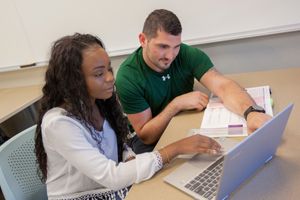
Gain a strong teaching foundation by earning a degree in your chosen content area through the College of Arts & Sciences while you learn how to teach adolescents through your course studies at the Center for Education. Plus, we’ll guide you through the requirements for secondary education certification in your particular subject.
You'll develop field experience gradually throughout your college experience, starting with one-on-one tutoring and small-group instruction and culminating with whole-class instruction through a semester-long student teaching placement. By the time you graduate, you’ll feel comfortable and confident in the classroom.
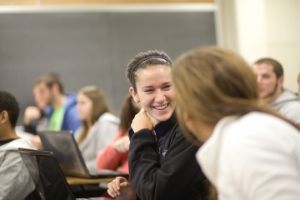
Prepare to be a well-rounded educator with global experience and diverse cultural perspectives. You can seamlessly integrate a study abroad experience during your student teaching semester.
Secondary Education majors also have the opportunity to join various clubs and organizations across and outside of campus to expand their network, including the Widener Student Education Association (WSEA), the Secondary Education Affinity Group, and many more
Learn more about studying abroad
View all health & human services clubs & orgs
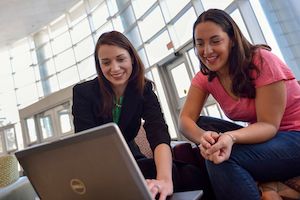
We want to get to know you and see you succeed. Professors will pay attention to how you learn and what you want to accomplish. Your Personal Student Success Team—faculty and peer mentors and liaisons for campus resources—will make sure your first year runs smoothly.
Without skipping a beat, you’ll have what you need to make Widener your second home. And you’ll know how to invest in the greater community, from professional opportunities in Philadelphia to volunteer experiences in your new backyard.
Lean more about faculty mentorship
Explore resources for academic & career support
Find support for health & wellbeing
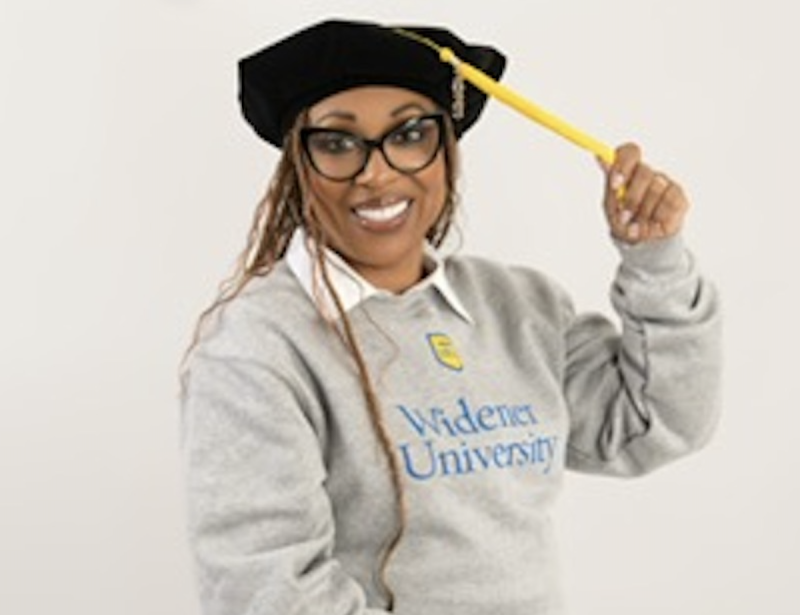
"“[Widener’s] hospitality fits my personality. I was able to get to know my professors and they got to know me. Especially when I went back for my bachelor’s, I said, ‘I have kids at home and I’m married; as a non-traditional student I need support’.” "
"I have authored or co-authored 15 publications in top-tier education journals and am honored to be a highly rated online professor of Widener students."
"Students become historians by "doing history" – they learn to think critically about the past, to develop research questions and conduct research, . . . and to have fun! History is an endlessly fascinating inquiry into the human past that can yield essential insights into the human present."
"My teaching focuses upon cognitive processing and application. In this regard, critical literacy complements the cognitive learning process. Critical literacy is the ability to actively read a text that promotes an understanding of social concepts and human relationships."
"My role as a mathematics teacher is to help students make sense of mathematics and develop conceptual understanding. I do this by helping students become actively involved in their learning through solving new and challenging problems rather than passively absorbing information."
"My interests include brain development, literacy development, and applications of technology in research and instruction. My greatest excitement in teaching comes from the way that working with graduate students spills over to my teaching of undergraduates and vice versa."
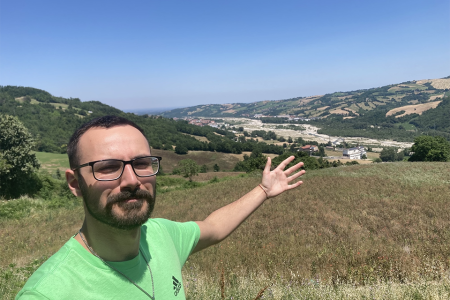
Traveling abroad can be an important part of the student experience. For Gianni DiMatteo ’24, he found academic and personal ties on a trip to Italy.
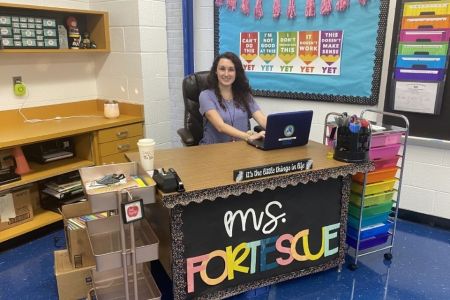
When COVID-19 forced the closure of K-12 schools in mid-March, Widener student teachers found themselves embarking on a new partnership with Agora Cyber Charter School.
Our admissions and financial aid teams are here to support you every step of the way. Have a question? Ask away!
Applying to Widener is easy—and free! Simply complete our Widener Application or the Common Application. You'll also need your official high school transcript and either an admissions essay or your SAT/ACT scores. We're a test-optional school, so there's no need to submit both.
Know you're interested in applying to Widener but unsure if you're ready to zero-in on a major? You can apply as an Exploratory Studies student with an undecided major. This program will help you start your college journey on the right foot while you explore which undergraduate program is the right fit for you.
We accept applications on a rolling basis—there are no hard deadlines. Apply when you're ready and we'll take a look as soon as we receive your app.
Key dates to keep in mind:
Once we receive your application and all materials, you can expect to hear back from us quickly. Along with your application decision, you'll also find out about any merit-based scholarship awards. You're automatically considered for merit scholarships as soon as you apply—you don't need to apply separately.
If you apply before November 1, you are considered an Early Action applicant which comes with benefits like:
All applications are non-binding, so why wait? Apply today!
Our admissions team will help you make the most of college-level credits earned after high school. We maintain strong partnerships and articulation agreements with numerous local community colleges and also accept a wide range of course credits earned at accredited colleges and universities.
Curious about how many credits may transfer? Email your transcripts to transfer@widener.edu and our transfer coordinator will personally review your coursework as an unofficial credit evaluation. Applicants are given priority during busy seasons, but you don't have to apply to work with our transfer coordinator.
Transferring doesn't have to be a guessing game—share your stats and we'll take it from there!
Widener University serves as a "second home" for students from around the world. We are located just outside of Philadelphia and close to New York City and Washington, D.C.—offering many unique professional and personal opportunities to explore.
Want to know what it's like to be an international student on campus or need assistance navigating English proficiency requirements? We're here to help, and our international admissions director will support you through the application process.
This support doesn't end with admissions—our International Student Support team will serve as a valuable resource throughout your Widener journey—meeting Visa/immigration requirements, getting acclimated to campus, and much more.
Learn more about applying as an international student
Learn more about life at Widener as an international student
Because Widener is a private institution, we're able to offer financial assistance that brings an exceptional education within reach. Complete your admissions application today to determine your financial aid package, including scholarships and grants.
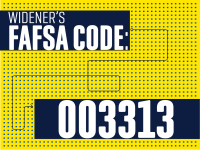
Submitting the Free Application for Federal Student Aid (FAFSA) is the first step to getting you the financial assistance to make the cost of college—an investment in your future—affordable. This free, online application is the gateway to grants, loans, and other forms of financial aid. Every year, the U.S. Department of Education offers billions of dollars in financial aid to eligible students. Widener gets in on the action, too, annually awarding aid to students with need.
You and at least one parent or caregiver will need a separate FSA ID to access the Federal Student Aid's online system and serve as your legal signatures. Make sure to create your unique FSA IDs before you get started. Our school code is 003313.
Nearly 100% of new full-time undergraduate students receive significant financial aid offers that reduce out-of-pocket costs and make a Widener education not only affordable, but well worth the investment. In fact, once your total financial aid is calculated, the cost of a Widener education is often equal to if not lower than other competitive universities–but with far superior outcomes for your career and earning potential.
The first step to see how much aid you qualify for is submitting the FAFSA.
Funding you don't have to pay back after graduation? That's a win-win! Scholarships and grants are a way for the university and other organizations to honor the academic, merit, and talent-based achievements of our students.
In the Accelerated Advantage 4+1 program, you can save up to a year of tuition by pursuing a master's degree—resulting in thousands of dollars in savings. During your fifth year of study, you can also apply for graduate-level scholarships and assistantships to further reduce education costs. To learn more about graduate scholarships and assistantships, please speak with your academic advisor during the spring semester of your senior year.
Widener's Experience MORE! program helps fund meaningful summer internship experiences for College of Arts & Sciences students to help offset the costs of underpaid or unpaid internships.
To visit Widener is to fall in love with the place. But don't take our word—experience it for yourself. Plan a visit to connect with our students, faculty, and staff.
We offer a variety of events to get to know Widener—from virtual sessions, workshops, and private tours, to the big splash of our signature open houses.
Have a question about Widener? Drop us a line and an admissions counselor will be in touch. We're always happy to help!
The secondary education bachelor's program is not currently accepting applications.
Muller Hall
University Pl
Chester, PA 19013
Kapelski Learning Center, Room 209
